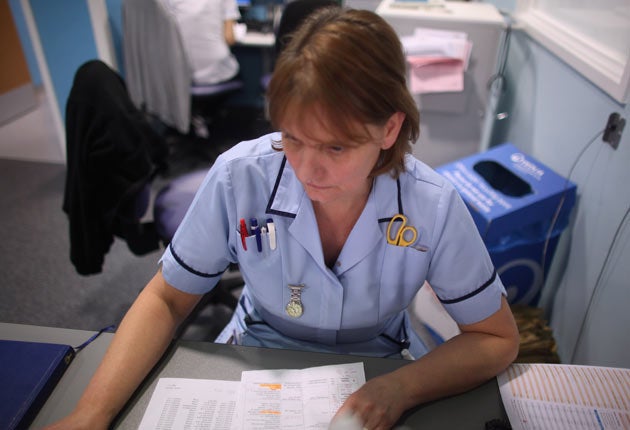A second degree is essential in healthcare

Postgraduate study is hard, competitive, expensive – and, in the health sector, can be the key to progression. "There is an expectation that senior healthcare professionals will have a postgraduate qualification if they're going to take on responsibility for designing and leading services for the future, and innovating in their practice," says Liz Clark, senior lecturer in health and social care at the Open University (OU).
She is echoed by Dr Bernard Gibbon, head of the School of Health at the University of Central Lancashire (UCLan): "Postgraduate training equips people with the advanced clinical practice skills valued by the NHS," he says. "If you think about how much we know about medicine now, an individual couldn't possibly study it all. You have to narrow it down. An undergraduate qualification only covers a general, safe level of competent practice over a range of clinical phenomena. When people specialise in physiotherapy or neuromuscular medicine or stroke care or whatever it is, they will want to do a top-up qualification."
Perhaps because of this, there is a significant postgraduate offering in health subjects at UK universities, including certificates and diplomas, Masters courses and PhDs. Some pursue these directly after completing a related undergraduate degree. More commonly, they form part of an individual's continuing professional development. "We work with the big healthcare employers to ensure our programmes match their needs," says Gibbon. "They are relevant to clinical practice." On the majority of UCLan postgraduate healthcare courses, students must equal study time with time in relevant employment. "They need experience of clinical practice," Gibbon explains.
Universities offering postgraduate healthcare courses need to keep a close eye on politics. For better or worse, the NHS is facing reform, and education provision must align. "Understanding the policy context healthcare professionals work in is absolutely crucial," says Clark, adding that using online materials makes it easier to deliver up-to-date programmes. "Policy context changes rapidly. The beauty of the new technologies is that they can be reviewed and updated annually."
Another change is the need to offer a more multidisciplinary environment. "We realise the world is changing and that healthcare workers now need to study alongside other healthcare practitioners," says Clark. The OU's MSc in advancing healthcare practice attracts a wide range of students, and UCLan's MSc in advanced practice in health and social care has a similarly diverse intake. According to Gibbon: "It doesn't matter if you're a paramedic, a midwife, a physiotherapist or an SLT [speech and language therapist] – we write the course with elective modules appropriate to what you're going to be doing in practice."
Other programmes are more niche. Louise Eaton gained her MSc in speech and language therapy at University College London. She says: "Everyone on my course had the intention of becoming an SLT." While it's possible to take a four-year BSc in the subject, Eaton's glad she took the postgraduate route: "I didn't know what I wanted to do when I first went to university, so I did a broader degree in social psychology, then a more specialist two-year Masters. You bring a lot from doing a different course first, different experience and knowledge. It's the kind of profession where life and social skills matter."
As for the cost, postgraduate healthcare courses needn't break the bank. UCLan courses are around £500 per module, usually with nine modules per qualification. The cost is the same for a year's full-time study or part time over two or three years.
"We're looking for motivated individuals who want to enhance their practice and make a difference to the patient experience," says Clark. "In the past, a lot was passed from generation to generation through 'sitting with Nelly'. We didn't have a robust evidence-based structure. Now, there's an expectation that practitioners will [use] the best available evidence." She concludes: "It's about education that really makes a difference, rather than an academic qualification in its own right."
Eaton backs this up. "I use what I learnt on my Masters every day," she says. "It was practical study that gave me the skills to do my job well."
Subscribe to Independent Premium to bookmark this article
Want to bookmark your favourite articles and stories to read or reference later? Start your Independent Premium subscription today.

Join our commenting forum
Join thought-provoking conversations, follow other Independent readers and see their replies